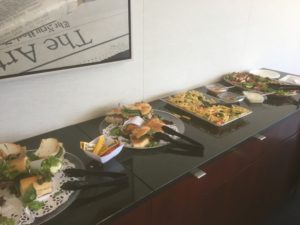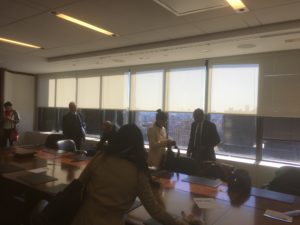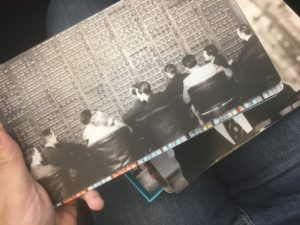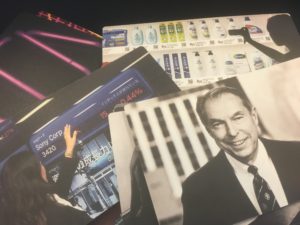Author: WenLin Pan
ARMA @Noon /October 18th
An ARMA Metro NYC conference names ARMA @Noon was held in NYC on October 18th.

Introduction:
ARMA invited Richard R. Gomes, a Corporate Culture and Engagement Strategist who works for Citi Group to present some concept of corporate archives as a business setting. The conference room located in Kelley Drye and Warren, 101 Park Avenue. There are around 20 people join the event – almost half male and half female. The rough estimate of the age range is from 25 to 80. Food and beverage provided in the side of the room, eating is allowed during the meeting. Also, they said the day is the first day they try to broadcast the conference to the members with a webcam at the front of the conference room. The conference started with a relaxing atmosphere, Ricard and the chair of ARMA briefly introduced themselves then asked everyone to do so.
Most of the participants are professional archivers, while Richard himself isn’t. He called himself a businessman instead of an archiver. He also mentioned he had no archive profession. I introduced myself as a graduate student who interested in the event and encouraged by my professor. One good thing is, ARMA kindly welcomes students and washed away my worry of attending a professional conference as an inexperienced novice.
Record:
The whole content of the conference focus on how to make longevity a competitive advantage. While “trust” is the most important element of banking, the value of archives could be significant. Historical archives of a business group are literally the proof of its stability and security. Better than propaganda, fact telling is all true. Richard illustrated the concept with an experience of expanding Citi’s business to Asian countries – mainly Japan. At the time, Citi group was actively expanding branches and franchises of overseas markets.
Deposit money at one place and withdraw money at the other side of the world was still an innovative concept decades before. They had encountered regulation and document problems when trying to get permission to found their business. Citi Group got through the obstacles by showing the government that they had a lot of experience dealing with various problems. The proves are convincing. He also mentioned that not only “good history” could be beneficial.
“Do you know we are blamed for Great Depression?” He asked. The uses of archives are not limited to keep tracks of the activities. Archives could show how the group went through and recover after difficult situations. Failure taught lessons, and Citi has learned from it. Sometimes the events themselves are not the ones weighing the most, it’s the flow of it, just like the core of programming codes is usually the logic but methods. These archives could also help analysts model the data and anticipate with the models. That is, another facet of difficult heritage: Teaching groups relevant to the history there is meaning over miserable memories.
The technique of storytelling is indeed important while turning heritage into business. We were passing a beautiful book and a box of well-designed paper cards with photo and text around the conference room. All of the products we saw were charming and informative. In addition to publishing brochures and the other paper products, Citi Group created some activate spaces for clients and other business uses. Richard said that is a good way to show the history of the group by sitting inside the history and talk about the future.
Instead of trust from the clients and governments, the archives are also benefitting the recruiting. There are thousands of talented freshmen every year. Just as the clients, they are also eager to know “Why Citi?” when there are over hundreds of different choices for their career. Sometimes understanding creates value. By telling the story, the group is able to attract talented new employees sharing the same memory (of the organization) and probably the same belief. Another benefit of building and preserving these archives is, some employees might want to be remembered. (“I don’t. “Richard joked.) With recognition and sense of belonging, they might work harder in the purpose to become a name carves on the group history.


As M. Schwartz and Terry Cook claimed:” Archives – as records – wield power over the shape and direction of historical scholarship, collective memory, and national identity, over how we know ourselves as individuals, groups, and societies.”[1] These modern memories have strong power within our identity. Except for common “interface” like museums, art galleries, libraries, historical monuments, the places Citi Group build for their clients and employees are somehow ignored in most of the academic articles.
Related experience:
The history of Citi Group reminded me in my college time our class was able to interview a manager from Mitsubishi Group, a Japanese business group which has experienced the history of “Black Ship” (The history that America use military power to “negotiate” a treaty allowing American trade with Japan.) They had kept a lot of precious and unique information. How they raised, how they traded. How people made money. I suppose with the enter of capitalist society, more and more historical footprints would be located in private cooperation but governmental record.
Conclusions:
At the end of the conference, Richard said that people should value data and archives just like valuing other resources. Longevity is resource, and it could create more resources. Knowing the importance of archives, he gave out three principles of business: Being investing, being effective and could be easily documented. Not like official files, specific collections usually don’t suffer cataloging problems like queer theories. The way people manage archives is more convenient than the official way. While they hold some control of their own event records and documents, more archives seem to be born in the way easier for archivers to deal with.
Even though Ricard doesn’t see himself as an archiver, he preserves the archives, makes use the archives and knowing the value of the archives. I would say Richard is more than an archiver but also a businessman. I was able to ask a question about one project of Citi Group – Citi Bike. There are similar things in my city. Our city government put them on the street to encourage people moving around. Richard kindly answered my question. I was so agreed with the things he said. It is important to let people know about the possibility of different choices. Whether it is shopping choice, a wider range of living area or knowledge access. The archive is the base of these possibilities.
[1] Schwartz & Cook, (2002), “Archives, records, and power: the making of modern memory”